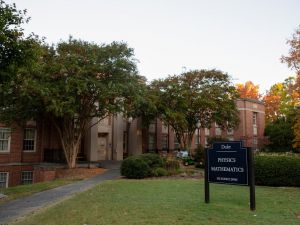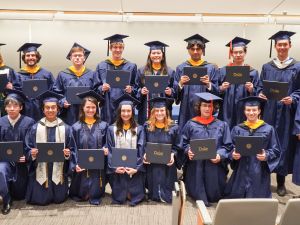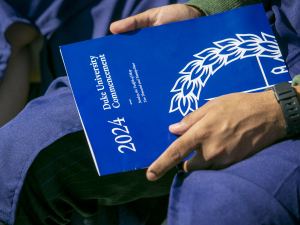From Pictionary to Science Policy, Passing by Hubble's Constant: A Walkthrough of the 2023 SPS Zone 5 Meeting
On a chilly Saturday morning in February, physics enthusiasts from across the Carolinas flocked to Duke University for the Society of Physics Students (SPS) Zone 5 Meeting. SPS zone meetings bring together SPS chapters from a given area of the country to meet SPS undergraduate students from other schools, brainstorm ideas for their chapters, and share student research. Eager to be meeting back in-person, students kickstarted the morning mingling as 70 participants from various SPS chapters arrived.
At ten o'clock, the SPS Zone Councilor Anthony Kuchera, assistant professor of Physics at Davidson College, Associate Zone Councilor Aidan Keaveney, a rising senior at Appalachian State, and Duke SPS Advisor Natalie Klco, assistant professor of Physics, kicked the meeting off. To break the ice, the Duke SPS Chapter divided the students into 10 teams to play a special physics-themed Pictionary. The game gave students a chance to introduce themselves and bond over laughs.
Conversations then pivoted to small group discussions on the events and activities that students run at their respective SPS chapters. One school created their own demos while another school utilized their school's planetarium to engage people in physics. To build community among their chapter and physics students, schools held events like Dress Up Like a Professor Day and used student lounges as a place for students to gather, work and get to meet other physics students. Many SPS chapters had small physics departments, so students discussed challenges of funding and getting students to attend SPS events.
Following the small group discussions came the highly anticipated Triangle Universities Nuclear Laboratory (TUNL) Tour. TUNL researchers showed attendees the Tandem Lab and the High Intensity Gamma Ray Source (HIGS) facility, as well as the FN tandem Van de Graaff accelerator, Enge Split-Pole Spectrometer and control room. All the while, students learned about the cutting-edge research being done at TUNL, including nuclear astrophysics, nuclear reactions, and accelerator physics.
Lunch took place during the graduate student panel. The panel consisted of three third-year graduate students — Emma van Nieuwenhuizen, Isabella Goetting and John Chiles — whose respective research fields are neutrinos, quantum computing and condensed matter. Since many of the attendees were undergraduate students, the panelists explained the process of applying to graduate school and why they chose to attend Duke. They recommended that attendees look for schools that have labs conducting research that interest them. Goetting mentioned that she did a variety of research as an undergrad, so, to make sure she knew that she wanted to focus on quantum computing, she took a gap year working at Los Alamos National Lab before applying to grad school.
The grad students also brought up that research experience plays a strong factor in admissions. With admissions for graduate school being highly competitive, they emphasized that not getting into grad school was not indicative of student’s abilities. Finally, van Nieuwenhuizen highlighted the importance of good work-life balance and cautioned the attendees not to attach one's self-worth to research. As an example, she mentioned recently signing up for figure skating lessons as a way to take time for herself.
Right after the panel, Assistant Professor of Physics Dan Scolnic gave a talk on his research challenging the most pressing topics in cosmology. As an experimentalist, he focuses on Type Ia supernova cosmology using data from cosmological surveys, such as Pan-STARRS, the Dark Energy Survey (DES), Rubin Observatory Legacy Survey of Space and Time (LSST) and Wide Field Infrared Survey Telescope (WFIRST). He studies calculations of Hubble's constant using supernovae as standard candles, standard model of cosmology and cepheids. During his talk, Scolnic also discussed communicating science and engaging with the scientific community and the public via Twitter.
Following Scolnic's talk was the poster session. Zone 5 participants presented their research including projects on wave packets, double star systems and nudot neutrinos. With topics covering particle and nuclear physics, astronomy, science policy, quantum mechanics and a diverse range of research techniques, participants had a perfect opportunity to learn about new research topics or have deep conversations on familiar research areas.
The next item on the agenda was a visit from Congresswoman Deborah Ross, the U.S. House of Representative for North Carolina's 2nd congressional district. Congresswoman Ross serves on the Environment Subcommittee and is the Ranking Member of the Energy Subcommittee. She expressed that her love for physics — she took physics and math classes in college and loved AP physics — translates into her work in Congress: she was part of allocating the largest NSF funding in history, passing the CHIPS and Science Act last year, which invests in semiconductor manufacturing in the U.S. and in science and technology research.
Ross then took questions from the audience for an open discussion on the intersection of science and policy. She discussed how students can get involved in policy and law, the need to distribute energy resources to micro-grids to homes and renewable energy prospects.
One meeting participant asked how scientists should deal with a politicized environment. Ross responded that "more speech, more facts" drown out the people spreading misinformation. She also highlighted that when it comes to science on an international level, criticizing other countries serves no purpose. It is best to come together so that everybody is involved.
At the end of the event, attendees met with their SPS chapters to debrief and reflect on what new ideas they can bring to their own chapter after the meeting. The meeting wrapped up with Kuchera announcing upcoming SPS elections and scholarships that students can apply for. Then, the meeting came to an end after a long, fun, and productive day at Duke University. The Zone 5 participants left energized and excited for the upcoming year.








